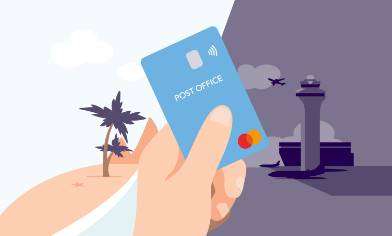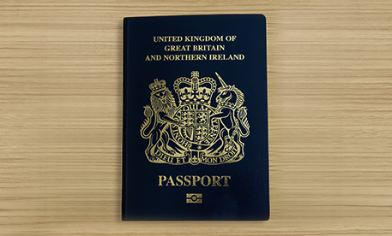Holiday spending, simplified
Travelling abroad? Getting foreign currency might be high on your to-do list, but it's equally important to choose the best card for your travels too.
While carrying some local cash is always handy, the right card could help you lock in the best exchange rates, meaning you get more for your money. And you could even avoid any extra fees for making payments or withdrawing cash too.
But which type of card is best for travelling abroad? Whether it’s a debit, credit or prepaid travel money card, each has its own different features that are worth comparing to find the right option for you.
Debit cards
You can use your debit card in most places where they’re accepted. They also give you instant access to your bank account. This could make it easier to track your spending, but you also might be more tempted to dip into your savings while you’re away. If your debit card gets lost or stolen, you can easily freeze or block it to keep your money safe.
But most banks will charge you for using your debit card abroad. Some might say your card is fee-free, but you might still be charged for payments or cash withdrawals.
Typically, you’ll be charged for one or all of these fees:
- If you make a payment abroad, you'll usually be charged a non-sterling transaction fee for converting the local currency. This fee applies every time you use your card. Some cards might also add a non-sterling purchase fee. This could be a fixed amount but can also be a percentage of what you spent
- If you withdraw cash at a foreign ATM, you’ll be charged a non-sterling transaction fee for currency conversion plus a non-sterling cash fee, either as a flat fee or a percentage
These fees can quickly add up, and you could risk overspending. Always check with your bank to see if your debit card has any hidden holiday spending charges.
Credit cards
Credit cards can be useful when travelling abroad. Like debit cards, they’re accepted almost everywhere and can be easily blocked if lost or stolen. They can also be handy for hotel check-ins and car rentals, as some companies might need to temporarily hold a specific amount of your balance when you book. They won’t take any money from your account, but this can help make sure you can cover any extra charges.
Credit cards also offer good exchange rates and extra protection. Purchases between £100 and £30,000 are covered under Section 75 of the Consumer Credit Act. This means credit card companies share responsibility if something goes wrong with the product or service.
Always choose to pay in the local currency to avoid bad exchange rates. And remember, if you withdraw cash from a foreign ATM using a credit card, you’ll likely be charged interest until you pay it back. This is sometimes at a higher rate than the interest on purchases, which could end up costing you a lot.
If you take your credit card abroad, spend with care so you don’t go over your credit limit. To avoid paying interest charges, try to pay your balance off in full each month. At the very least, make the minimum monthly repayments so you don’t damage your credit score.
Prepaid travel money cards
A prepaid travel card is a convenient and secure way to manage your money while travelling. You simply top it up before your trip and use it to make payments and withdraw cash from ATMs in the local currency of your choice.
These cards don’t require any credit checks and are not linked to your bank account, giving you an extra layer of security against theft or fraud. They can also be blocked or frozen if something goes wrong.
Here's what you can expect from the Post Office Travel Money Card:
- Load up to 22 currencies safely and securely
- No charges when you spend abroad*
- Use it in millions of shops, restaurants and bars in more than 200 countries
- Make contactless, Apple Pay and Google Pay™ payments
- Top up, manage or freeze your card, transfer funds between currencies, view your PIN and more all in our free travel app
You can order one online, in our app or by visiting a local Post Office branch.
*No charges when you spend abroad using an available balance of a local currency supported by the card
What about foreign currency?
While using a card during your travels is useful, it’s always handy to carry some foreign currency too. Cash can be essential for immediate payments or small purchases, like paying for public transport, buying a snack, or tipping someone in a restaurant or bar. In remote or rural areas, some local shops also might not accept cards.
To get the best exchange rates, consider ordering your foreign currency in advance online, instead of exchanging money at the airport or at your destination. This can help you avoid higher rates.
And remember, try not to carry large amounts of cash at one time.
Key takeaways
We compared debit, credit and prepaid travel money cards to find out which type of card is best for spending abroad:
- Debit cards are widely accepted and give you instant access to your bank account. But most have hidden charges for payments or cash withdrawals abroad, which can quickly add up. Always check with your bank to see if your debit card is fee-free
- Credit cards are also widely accepted. They have good exchange rates and purchase protections. And they're handy for hotel check-ins or car rentals. Always spend wisely on a credit card. Try to pay off your balance in full. And avoid withdrawing cash, as you’ll likely be charged a high interest rate
- Prepaid travel money cards are a convenient and safe option. They allow you to load multiple currencies and are accepted in millions of locations worldwide. You can use these cards to lock in the best exchange rates and there are no hidden charges when used correctly



































